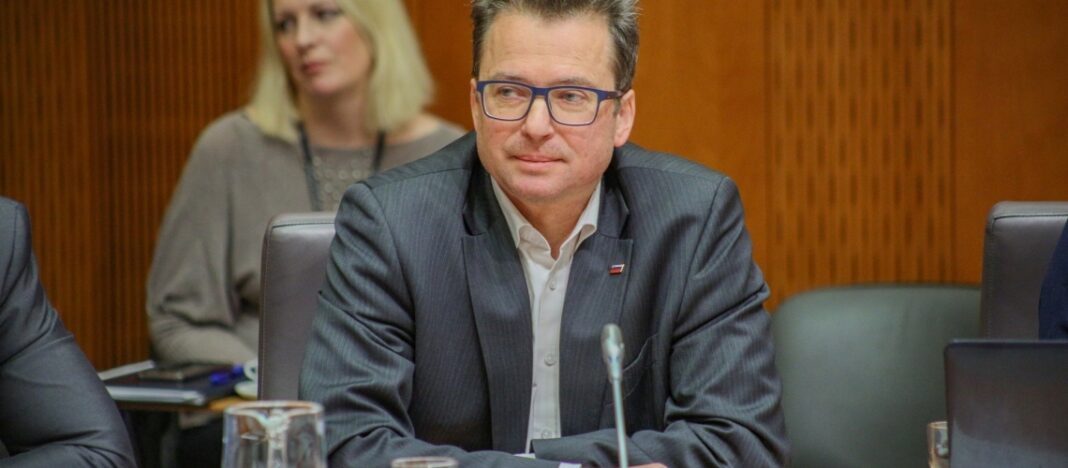By: Sara Bertoncelj / Nova24tv
Minister Zvone Černač told national television that the Recovery and Resilience Plan is historic due to the awareness that at least 1.8 billion euros will be available to us, provided that we implement the reforms we have written in the said Plan. “One should be aware that some of these reforms are already happening and that individual influential groups are very strongly opposed to them, which can be a problem in the future for the availability of these funds,” he said. One such example is the reform related to the Demographic Fund Act, which brings about the stability of the pension system and the regulation of long-term care. “If these changes are not implemented, then there will be no access to the funds,” he emphasised. Among other things, the Minister once again clarified Luka Mesec’s gossip, saying that the European Commission had twice negatively assessed Slovenia’s Plan.
The Minister of Development and the EU’s Cohesion Policy Zvone Černač, spoke in a statement for the show Točka preloma on Television Slovenia about the National Plan for Recovery and Resilience. He emphasised that it was of historical importance for Slovenia – not because of the 1.8 billion euros in funds, but because of the reforms that we had written in the Plan and which should have been carried out in previous years, but were not. He also responded to allegations from the economy and energy that the two Recovery and Resilience Plans were underfunded for these two areas. It is clear that the problem is not a lack of funds, but the economic and rational use of this money. He also emphasised that 1.8 billion euros is only a small part of the total of 9 billion euros available to Slovenia from several financial mechanisms by 2030.
The show on the national television hosted Dr Mojmir Mrak, from the Faculty of Economics. They talked about what European funds will enable, why the economy is not satisfied with the plan for recovery and resilience, and why the digitalisation of companies is important. The show also included two short recorded excerpts from Minister Černač, which the editorial board edited in its own way, as it suited them. Among other things, the Minister once again clarified the harassment of Luka Mesec, who until February 21st claimed that the European Commission had twice negatively assessed the Slovenian Plan, but as the Minister said: “On February 21st, a regulation allowing these plans to be submitted to the procedure was just adopted,” which caught Mesec in a lie. It should not be overlooked that Slovenia was among the first six countries to adopt a decision on securing its own resources at the end of January, which is a condition for activating these funds, and among the first 13 countries to submit a Plan for Validation to the formal procedure by April 30th. “And this plan is the one on which the European Commission will give its assessment, and everything else was preliminary harmonisation at the administrative and technical level for the Republic of Slovenia as well as for other Member States.” The purpose of these coordinations was for Slovenia to prepare a Plan that will be operational, beneficial to the economy and people, and ultimately realistically feasible in the next five years.
The problem is not a lack of money, but a smart spending of that money
To the statements that they wanted more funds provided under the Recovery and Resilience Plan in the energy sector for distribution networks and also in the economy for digitalisation of the economy, Minister Černač replied: “As far as digitalisation is concerned, all the money will end up in the economy. This is an artificial creation of dilemmas,” and explained: “We have distributed funds for the modernisation of digital or information systems in the public sector and in the state administration, but in the end the funds we allocate for the modernisation of these systems will end up in the economy, with economic operators.” As he said, never before in the history of this country has so much funds been allocated for this area in such a short period. “More important is the question of whether we will be able to use these significant funds, which go to a few 100 million euros, also usefully and wisely. Will we actually use this money to reach a further stage in the field of information society and system support, or will we not take advantage of this opportunity? The problem here is not a lack of funds, but the main task is to ensure appropriate technological and information renewal, which we did not do many years ago. So this public sector-economy funding dilemma is artificially established.” He is also convinced that enough funds are allocated for energy. He explained that the problem of energy is not a lack of money, but in the past it has always been a problem of spending this money wisely – and if we discuss in this way, the same problem may happen in the future.

